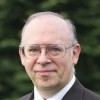
Studies suggest that nearly all software errors are triggered by the interaction of no more than six parameters. If so, testing all n-way combinations of parameters should provide high confidence that nearly all faults have been discovered. This combinatorial testing is already used by dozens of companies. Dr. Black will explain what combinatorial testing is and how to apply it to different situations. Given 10 binary variables, can you exercise all triples with fewer than 20 tests? He refers to free software available to generate such "covering arrays" for combinations of parameter values. He will also talk about approaches to the testing oracle problem which automatic test generation raises.
Dr. Black has nearly 20 years of industrial experience in areas such as developing software for IC design and verification, assuring software quality, and managing business data processing. He is now a Computer Scientist at NIST and leads the SAMATE project (//samate.nist.gov/). The web site he began and edits, the on-line Dictionary of Algorithms and Data Structures, (//www.nist.gov/dads/) is accessed almost 20,000 times a day from all over the world. He works in the Systems and Software Division of the Information Technology Laboratory.
Dr. Black earned a B.S. in Physics and Mathematics in 1973 and an M.S. in Computer Science in 1983. He began his Ph.D. at UC Berkeley, then transferred to Brigham Young University where he graduated in 1998. Dr. Black has been active in the formal methods research community, and has served as a reviewer for DAC (Design Automation Conference) for several years. He has taught classes at Brigham Young University and Johns Hopkins University. Dr. Black has published in the areas of static analysis, software testing, software configuration control, networks and queuing analysis, formal methods, software verification, quantum computing, and computer forensics. He is a member of ACM, IEEE, and the IEEE Computer Society.
